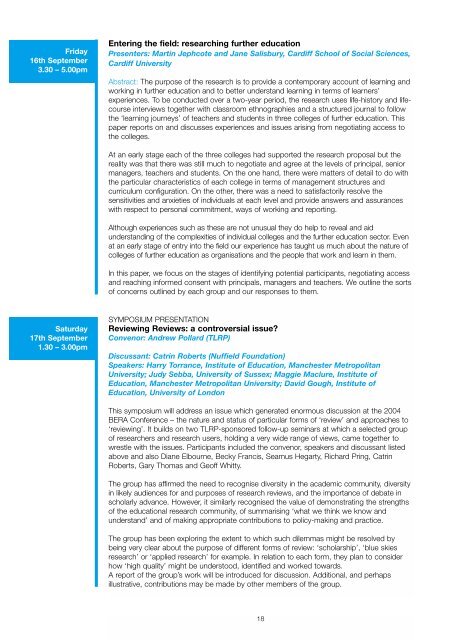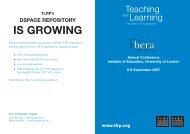Bera Booklet 2005 - Teaching and Learning Research Programme
Bera Booklet 2005 - Teaching and Learning Research Programme
Bera Booklet 2005 - Teaching and Learning Research Programme
- No tags were found...
Create successful ePaper yourself
Turn your PDF publications into a flip-book with our unique Google optimized e-Paper software.
Friday16th September3.30 – 5.00pmEntering the field: researching further educationPresenters: Martin Jephcote <strong>and</strong> Jane Salisbury, Cardiff School of Social Sciences,Cardiff UniversityAbstract: The purpose of the research is to provide a contemporary account of learning <strong>and</strong>working in further education <strong>and</strong> to better underst<strong>and</strong> learning in terms of learners’experiences. To be conducted over a two-year period, the research uses life-history <strong>and</strong> lifecourseinterviews together with classroom ethnographies <strong>and</strong> a structured journal to followthe ‘learning journeys’ of teachers <strong>and</strong> students in three colleges of further education. Thispaper reports on <strong>and</strong> discusses experiences <strong>and</strong> issues arising from negotiating access tothe colleges.At an early stage each of the three colleges had supported the research proposal but thereality was that there was still much to negotiate <strong>and</strong> agree at the levels of principal, seniormanagers, teachers <strong>and</strong> students. On the one h<strong>and</strong>, there were matters of detail to do withthe particular characteristics of each college in terms of management structures <strong>and</strong>curriculum configuration. On the other, there was a need to satisfactorily resolve thesensitivities <strong>and</strong> anxieties of individuals at each level <strong>and</strong> provide answers <strong>and</strong> assuranceswith respect to personal commitment, ways of working <strong>and</strong> reporting.Although experiences such as these are not unusual they do help to reveal <strong>and</strong> aidunderst<strong>and</strong>ing of the complexities of individual colleges <strong>and</strong> the further education sector. Evenat an early stage of entry into the field our experience has taught us much about the nature ofcolleges of further education as organisations <strong>and</strong> the people that work <strong>and</strong> learn in them.In this paper, we focus on the stages of identifying potential participants, negotiating access<strong>and</strong> reaching informed consent with principals, managers <strong>and</strong> teachers. We outline the sortsof concerns outlined by each group <strong>and</strong> our responses to them.Saturday17th September1.30 – 3.00pmSYMPOSIUM PRESENTATIONReviewing Reviews: a controversial issue?Convenor: Andrew Pollard (TLRP)Discussant: Catrin Roberts (Nuffield Foundation)Speakers: Harry Torrance, Institute of Education, Manchester MetropolitanUniversity; Judy Sebba, University of Sussex; Maggie Maclure, Institute ofEducation, Manchester Metropolitan University; David Gough, Institute ofEducation, University of LondonThis symposium will address an issue which generated enormous discussion at the 2004BERA Conference – the nature <strong>and</strong> status of particular forms of ‘review’ <strong>and</strong> approaches to‘reviewing’. It builds on two TLRP-sponsored follow-up seminars at which a selected groupof researchers <strong>and</strong> research users, holding a very wide range of views, came together towrestle with the issues. Participants included the convenor, speakers <strong>and</strong> discussant listedabove <strong>and</strong> also Diane Elbourne, Becky Francis, Seamus Hegarty, Richard Pring, CatrinRoberts, Gary Thomas <strong>and</strong> Geoff Whitty.The group has affirmed the need to recognise diversity in the academic community, diversityin likely audiences for <strong>and</strong> purposes of research reviews, <strong>and</strong> the importance of debate inscholarly advance. However, it similarly recognised the value of demonstrating the strengthsof the educational research community, of summarising ‘what we think we know <strong>and</strong>underst<strong>and</strong>’ <strong>and</strong> of making appropriate contributions to policy-making <strong>and</strong> practice.The group has been exploring the extent to which such dilemmas might be resolved bybeing very clear about the purpose of different forms of review: ‘scholarship’, ‘blue skiesresearch’ or ‘applied research’ for example. In relation to each form, they plan to considerhow ‘high quality’ might be understood, identified <strong>and</strong> worked towards.A report of the group’s work will be introduced for discussion. Additional, <strong>and</strong> perhapsillustrative, contributions may be made by other members of the group.18
















